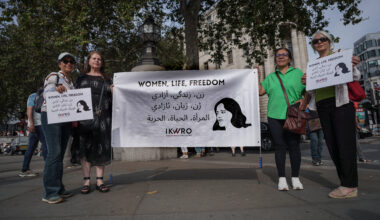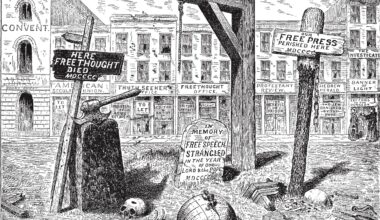
We all remember Hans Christian Andersen’s folktale ‘The Emperor’s New Clothes’ in which charlatans convince the vain Emperor that only clever people can see the clothes they make for him. Everyone goes along with this delusion for fear of looking stupid, including the Emperor’s advisers. Until, that is, they parade through the town one day and a little boy shouts, ‘The Emperor has no clothes!’ Thus the spell is broken and the people laugh at their Emperor. Feeling embarrassed, the Emperor continues on with his parade, for now he fears looking foolish.
There is a parallel here with the religious mindset. Religious people often need everyone else to share their beliefs. Why? Are they just so enraptured with their faith that they feel they are doing everyone a favour by proselytising? Or could it be that a part of them knows their beliefs are, shall we say, unscientific at best? Who knows—perhaps these itchy doubts are soothed by the participation of all?
The Bible itself, not atypically, gives mixed messages on this need to ‘witness’ private beliefs. Jesus extolls Simon and Peter to leave behind their nets and become ‘fishers of men’ rather than of fish. And yet Matthew 6:5 says that ‘when thou prayest, thou shalt not be as the hypocrites are: for they love to pray standing in the synagogues and in the corners of the streets, that they may be seen of men.’
Which is it? And where do we draw the line in a modern, secular society? Freedom of religion and freedom FROM religion is an important principle for secularists. The right to hold religious beliefs and not to be persecuted or discriminated against is paramount, but sometimes the invocation of ‘religious freedom’ is used as cover by the religious to make special claims and demand special platforms for themselves. Examples of this are endless so forgive my summarising of some of the more egregious examples in modern Britain:
- We have unelected clerics in national and local government (bishops in the House of Lords and, in Scotland, religious nominees on council education committees). Embarrassingly, this makes the UK one of two countries to have unelected clerics in government. The other is Iran.
- Taxpayer-funded faith schools can often select their students using religious criteria and are allowed exemptions from many equality laws, notably in their teaching of sex education.
- There is compulsory religious (Christian) observance even in state schools. (Note that this is very different from Religious Education classes, which teach about, rather than preach, religion.)
- In Scotland under the new Hate Crime Act, religious belief (a choice) is a ‘protected characteristic’ on a par with immutable personal identities like race and sexual orientation.
- We allow the mutilation of children’s genitals for non-medical reasons—so long as the mutilators are convinced that they are carrying out a religious duty. Why is religious custom a protection from activities which would normally be criminal?
- Religion is given automatic stewardship of events like Remembrance Sunday. If important civic events like this are to be chained to an ever-diminishing Christianity, there is a real danger that both will be forgotten together.
- Religions are given privileges in charity law: to become a registered charity (with accompanying tax breaks), ‘the promotion of religion’, however controversial the views in question, is de facto in itself sufficient to qualify.
- The state pays for hospital chaplains. Why should a niche service which only serves a minority be paid for by all?
- Churches are empowered by the state to solemnise marriages and yet many, notably the established Church of England, retain the power to decide the marriages of which they approve.
Here, we must distinguish between secularism and atheism. Atheism is a metaphysical position which holds that there is no good reason to believe in any gods. Secularism is a principle of social administration by which the state is kept separate from religious influence (and vice versa).
For secular campaigners, this is an important line. Secularists campaign for secularism, not for atheism: a distinction which too many still fail to appreciate. Secularists do not seek to impose state atheism. So when the religious argue that ‘you just want to impose your atheism in place of our religion!’, the proper response is to compare this to a noisy neighbour arguing that ‘you just want to impose your silence in place of my noise!’
Last year in Scotland there was an SNP leadership election; the winning candidate would become First Minister. That one of the candidates, Kate Forbes, declared her opposition to marriage equality on account of her religious beliefs flagged up an interesting nuance in the argument about ‘religious freedom’.
Ms Forbes, I assume, did not rise to her political position because of her Christianity so there was no unfair religious privilege involved here. She was entitled therefore to allow her religious views to inform her political views, as she did. Similarly, the public was entitled not to vote for her because of her views. No arguments so far, but the problem arises from the fact that her defenders argued that to reject her candidacy because of her homophobia was to discriminate against her Christian beliefs! This clash of ‘protected characteristics’ has come up before (remember the gay cake). [Update: Forbes is now Deputy First Minister – Ed.]
For various reasons, including (but far from limited to) the need to fill in explanatory gaps and the human impulse to seek agency where there is none, religious belief has been and remains incredibly tenacious. But tenaciousness is not a testament to worthiness, nor does it mean that religion ought to be privileged in public life. It might bring comfort to many, and no secularist would wish to deny this comfort to those who need it, but religious freedom should not grant a seat next to the Prime Minister.
Like the mythologies of all the many world religions, the Bible might still contain comfort and wisdom for some, but Christian belief has declined precipitously in the UK—and that trend shows no sign of stopping. Historic churches are falling into disrepair and rightly being taken over by the state to be used as premises for all. Christianity no longer represents Britain, and Christians must now act with grace: they must decouple from local and national government and they must relinquish their privileges. In short, they must be content to be treated equally under the law. The same, naturally, applies to all other religions.
Nobody begrudges the faithful their private beliefs but if they expect religious freedom to mean religious privilege, they risk being humiliated by any little boy who shouts, ‘The church has no clothes!’
5 February 2026: I am sad to report that Neil Barber died, far too young, on 24 January 2026. He was a staunch champion of secularism in Scotland and will be missed by many. You can read his obituary here and, if you knew him, contribute messages and memories about him for his loved ones here. My own contribution is as follows:
I only knew Neil a little, and a few years ago, through the Edinburgh Secular Society, but we sporadically kept in touch by email. I was delighted to publish an article by him in the Freethinker magazine, which I edit (read the article here: https://freethinker.co.uk/2024/05/the-case-for-secularism-or-the-churchs-new-clothes/).
I was shocked and saddened to hear of his passing. He was kind and passionate and energetic, and he will be much missed, both by his loved ones and the secularist/humanist community for which he did so much. He will be remembered with love by many, and I hope that his article will play some part in securing his legacy—and keeping it alight for a long time to come.
~ Daniel James Sharp, editor
Further reading
Atheism, secularism, humanism, by Anthony Grayling
Disestablishment and Bishops in the House of Lords
‘This is not rocket science’: the Disestablishment of the Church of England Bill 2023, by Emma Park
Bishops in the Lords: Why are they still there? by Emma Park
Religion in schools
Faith schools: where do the political parties stand? by Stephen Evans
Religion and belief in schools: lessons to be learnt, by Russell Sandberg
The Scottish Hate Crime Act
From Satan to the Hate Monster, by Emma Park
Faith Watch, March 2024, by Daniel James Sharp
Is the spirit of liberty dead in Scotland? by Noel Yaxley
Genital mutilation
Circumcision: the human rights violation that no one wants to talk about, by Alejandro Sanchez
Religion and charity law
Faith and charity law: time for a rethink and Secularism is a feminist issue, by Megan Manson








1 comment
Some interesting points , but I think you are overstating the influence of the few believers who , through most of Western history have, like you , had big issues with ” the church” when it was big . On that fascinating reality that Iran and Britain share priests in high office , It is even kind of funny for us believers to think of that truly wonderfully wise Elizabeth failing to get rid of all the vestiges of religious attachments that so annoyed the new Europe and continue to annoy those with more radical Christian roots. Maybe you should move to America to join the Puritans ?
Please, if you do that please don’t send any more of your kids to our schools . We have enough trouble with preachy believing teachers quiting because the school vibe has been usurped by the unbelieving secularists kids who dominate in them.( Faith must have done something good that you people support such schools)
Be honest , we have worked hard to set up our schools and hospitals, but they are no longer ours .
Your complaint that true followers of Christ are too influential should be addressed (by prayer?) to God and using the book itself ( 2 harmless action entities surely) because at the practical level of ownership and independent authority ,your sort of governments control us, and we faithful are approaching the time of Emperor Julian.
Your email address will not be published. Comments are subject to our Community Guidelines. Required fields are marked *
Donate